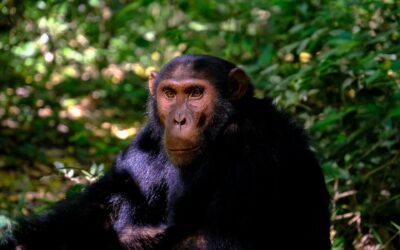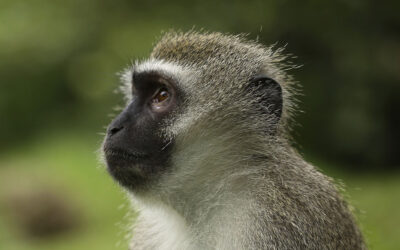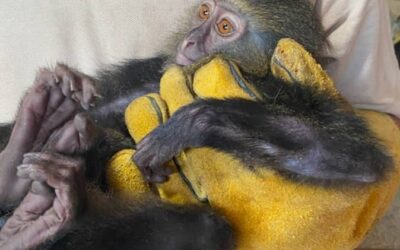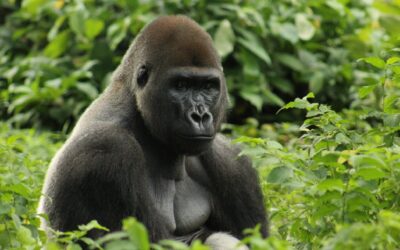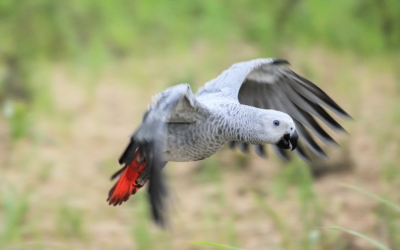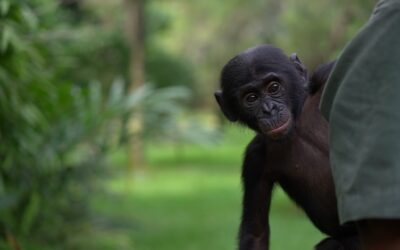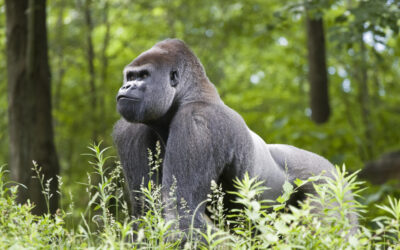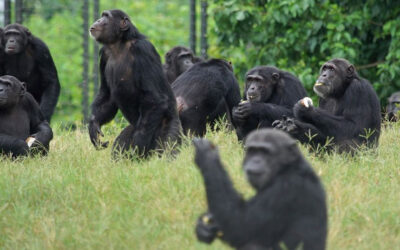Conservation or exploitation? You decide.

PASA joined with countless other nonprofit organizations and concerned citizens to urge U.S. Fish and Wildlife not to approve the export and allow the chimpanzees to live in an accredited, nonprofit primate sanctuary in the U.S. Despite this pressure, USFWS approved the transfer.
True Test of USFWS Protection
In June 2015, the U.S. Fish and Wildlife Service, which is responsible for enforcing the Endangered Species Act as well as CITES regulations, ended a longstanding distinction between chimpanzees in the wild and chimps in captivity. The Endangered Species Act is very strong legislation that forbids transferring or harming endangered species for any purpose except to advance the conservation of the species in the wild. USFWS had considered wild chimps to be “endangered” and therefore receive protection under the Endangered Species Act, but chimps in captivity were not. This left the chimps used for research and entertainment in the U.S. vulnerable to exploitation and abuse. However, after years of pressure from animal protection organizations, USFWS has finally granted protection to all chimps.
The first true test of this arose when Yerkes, a center that experiments on primates for biomedical research, announced its intention to send eight chimpanzees who were retired from research to Wingham Wildlife Park, a zoo in England that is not accredited by any of the major accreditation organizations and has not cared for chimps before. PASA and a multitude of other wildlife conservation and animal welfare organizations are strongly opposed to this for several reasons. In particular, if this transfer is allowed, it would the Endangered Species Act, as it does not enhance the conservation of the species.
This transfer can set a very dangerous precedent of transporting endangered animals to other countries under the guise of conservation.

Furthermore, this transfer can set a very dangerous precedent of transporting endangered animals to other countries under the guise of conservation when the underlying motive is financial profit. It would allow Yerkes to avoid financial responsibility for the lifetime care of the chimps they used for biomedical research. The zoo in England is heavily promoting the acquisition of these chimpanzees in order to increase its ticket sales.
More information is on the New York Times website.
PASA joined with countless other nonprofit organizations and concerned citizens to urge U.S. Fish and Wildlife not to approve the export and allow the chimpanzees to live in an accredited, nonprofit primate sanctuary in the U.S. Despite this pressure, USFWS approved the transfer. Now NEAVS, the New England Anti-Vivisection Society, is taking the issue to court to try to prevent Fish and Wildlife from issuing a permit for the transfer.
Please read more here. This article includes quotes from Richard Wrangham, a PASA Board member.
Next Posts
5 Summer Activities to Foster Conservation Education with Young Children
Here are 5 fun and educational activities that promote conservation awareness and environmental responsibility.
PASA and the QATO Foundation Partner to Protect Chimpanzees in DRC
PASA and its member J.A.C.K. Sanctuary partner with the QATO Foundation to create a bold new island sanctuary for up to 120 rescued chimpanzees in the DRC.
Trophy Hunting Myths Debunked
NGOs tackle misinformation about trophy hunting spread by the hunting lobby.
Largest Seizure of Monkeys in Africa Welcomed to J.A.C.K. Sanctuary in the Democratic Republic of Congo
Trafficking of African primates from Africa to Asia was thwarted with confiscated animals repatriated and sent to an accredited PASA member sanctuary.
5 Ways to Help Save Gorillas
Anyone can have an impact on gorilla conservation through simple actions.
Celebrate World Parrot Day with PASA!
This World Parrot Day, we are celebrating four of our amazing member sanctuaries that offer a second chance to rescued parrots!
What is an Endangered Species?
This article explains what it means to be “endangered” and explores how human activities can threaten species. It also highlights how Pan African Sanctuary Alliance (PASA) member centers rescue, rehabilitate, and conserve endangered primates and their habitats.
Celebrate 23 Years of PASA in 2023
PASA turns 23! It’s 2023 and we’re asking you to help us celebrate our 23 member sanctuaries and our 23 years of protecting primates. To mark this day, we are launching our Primates Forever Campaign to ensure magnificent great apes and monkeys remain wild and protected.
Viruses in Sanctuary Chimpanzees Across Africa
New research finds that sanctuary chimpanzees are infected with viruses previously found in wild chimpanzees. Additionally, it suggests that, like in the wild, sanctuaries experience reverse zoonotic respiratory virus transmission.
Women in Conservation: Two Wildlife Heroes in West Africa
This International Women’s Day, celebrate the dedication and achievements of two women working to protect wildlife and inspire the next generation in West Africa.


